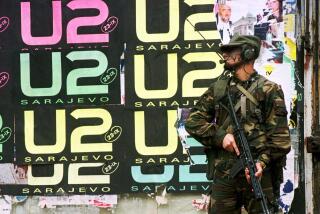When the West made a difference
- Share via
UNILATERAL U.S. military action and U.N. administrative control are out of favor today, but 10 years ago they collectively created a more stable world.
In 1992, the chaos of a disintegrating Yugoslavia descended on Bosnia-Herzegovina. Following a declaration of independence, Bosnian Serbia laid siege to the province’s capital, Sarajevo, and began ethnically cleansing the countryside. Muslim Bosniaks and Christian Croats formed their own armies in response. By 1994, Bosnia was stippled with concentration camps, rape hotels and gutted villages. United Nations troops sent to create havens for noncombatants tacitly sided with the Serbs.
Europe’s response was muted. No member of the European Union called for intervention. British politician Lord Owen, who, along with former U.S. Secretary of State Cyrus Vance, was appointed to a peace commission to find a solution, advocated the partition of Bosnia along ethnic lines, a solution that would have rewarded genocide.
The Clinton administration dispatched Assistant Secretary of State Richard Holbrooke to the Balkans. Confronted by the threat of U.S. military intervention, Bosnia’s warring factions laid down their arms and agreed to accept 60,000 NATO peacekeepers.
When I arrived in Sarajevo in autumn 1998, tensions still ran high. Croats, Bosniaks and Serbs refused to meet in the same room. Sarajevo declined to rebuild structures destroyed during the siege because they were regarded as symbols of Serb perfidy. In the Serb city of Banja Luka, vacant lots marked the former sites of mosques. In Herzegovina, the truncated towers of the 16th century Ottoman Bridge that Croats had destroyed symbolized the division of Mostar.
There was peace, but only because U.S. troops had sealed the borders, the Italian Carabinieri patrolled Sarajevo, France pursued war criminals and Ukrainians kept Herzegovina’s roads open.
Made up of thousands of aid workers, the international community was charged with creating a civil society. But what was that? My experience dictated that the media be free of government control. Most of my European colleagues, however, were from countries where political parties owned the newspapers.
By 2002, rubble still covered 50% of Mostar. A landfill built by the U.N. was only partly used because Croats refused to put their trash in a dump containing Muslim garbage. World Bank plans to repair a water system built by Austrians in 1873 almost fell through after Croats threatened not to drink from pipes that also carried water to Muslim households. To reduce tensions, the U.N. ordered all ethnically offensive phrases marked out of school textbooks. But instead of using black markers to eliminate the words “grand Serbian aggressors” from beneath the picture of an amputee, Croat teachers highlighted the words in yellow.
But the U.S., NATO and the EU persisted. One by one, war criminals were captured and sent to The Hague for trials widely perceived to be fair. Survivors of ethnic cleansing returned under guard to their villages. Elections of xenophobic politicians were nullified. For Bosnia-Herzegovina, the new millennium symbolically began in 2004 when the rebuilt Mostar Bridge reopened.
On Dec. 14, 1995, the U.S.-shaped Dayton accords were signed, forcing warring Muslims, Croats and Serbs in Bosnia-Herzegovina to stop fighting and cede control of their country to the U.N. and NATO.
Today, Bosnia is a symbol of what Western democracies can accomplish when they work together. Although 6,500 European peacekeepers remain, there is little for them to do. Political hacks and corrupt judges have been purged from the judiciary. Three months ago, Bosnian Serbs, yielding to international pressure, disbanded their army and folded the troops into a unified national command. The drive toward unification extends to the political realm. This week, Bosnia will celebrate its 10th year of peace by beginning work on a new constitution that will create a unified government without regard to ethnicity.
Meanwhile, Bosnia’s Muslims have distanced themselves from Wahhabi extremists and started arresting Afghan and Chechen mujahedin who flocked to Bosnia during the war. “Bosnia has become a reliable partner in the global fight against terrorism,” said U.N. High Representative Paddy Ashdown.
More to Read
Sign up for Essential California
The most important California stories and recommendations in your inbox every morning.
You may occasionally receive promotional content from the Los Angeles Times.













